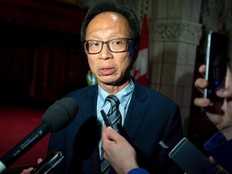Kevin Connor
LATEST STORIES BY KEVIN CONNOR
Judge dismisses lawsuit over English-only sign in government building
There is no compensation for hurtful signs. Michael Thibodeau, a retired federal IT consultant from Ottawa, has lost a bid for thousands in damages after seeing an English only “caution wet floor” sign in a government building, according to Blacklock’s Reporter. Thibodeau was seeking $19,500 in damages, arguing the English-only warning caused him “loss of enjoyment of life.” “I am not convinced Mr. Thibodeau is deserving of any of the remedies he seeks,” wrote Justice Peter Pamel. There was “no basis” for compensating Thibodeau, he said. “I am dismissing Mr. Thibodeau’s application.” The Department of Public Works agreed its signs were in breach of bilingualism law. Recommended video “I feel my rights are infringed when I am confronted with this type of unilingual English or predominantly English signage. It causes me frustration, stress and loss of enjoyment of life. I suffered stress because my identity as a francophone was threatened and I felt like a second-class citizen,” Thibodeau wrote to the court. “The right to be served in French is a constitutional right and to me is a very important fundamental right. As an individual I have identified with the French language since I was very young and when I am refused the right to be served in French in terms of either service or signage my identity as an individual and my sense of belonging to one of the two founding peoples of Canada is threatened.” Thibodeau has been self-represented in courtrooms and has won damages. In 2021, a federal judge awarded Thibodeau $11,000 after he discovered the website at the St. John’s Airport Authority wished travellers “Happy St. Patrick’s Day” in English only. “Mr. Thibodeau has not visited the St. John’s Airport himself,” the court said.

China's interference improves relations, says Liberal-appointed Senator
China’s foreign interference is “mostly aimed at improving bilateral relations,” says a Liberal Senate appointee. Blacklock’s Reporter says Sen. Yuen Pau Woo says he personally overheard a Chinese diplomat advise a Canadian audience on how to vote. But Woo insisted there was no reason to worry. “He warned we should not stigmatize people for listening to the Chinese position on an issue and making up their own minds,” said the Sept. 30 affidavit filed with counsel at the Commission on Foreign Interference. “He noted, for example, he has been to functions in Canada where a Chinese diplomat would tell the audience that Canada-China relations are in a bad way and would encourage attendees to vote and advocate for better bilateral relations. While such actions may offend Canadian sensibilities because of antipathy towards China, they do not amount to foreign interference, according to Sen. Woo.” In 2020, Woo had an appearance at a $10-per-ticket meeting of the Canada-China Friendship Society. Recommended video “Sen. Woo’s view is the Chinese Communist Party is not interested in domestic Canadian legislation,” said the affidavit. “He does not get lobbied by China on gun legislation, for example, whereas he is frequently lobbied by American interests on that subject.” The Chinese Communist Party “continues to cultivate the favour of overseas Chinese communities,” Woo said in his affidavit. “He said this is not necessarily sinister, comparing it to other ethnic groups like the Irish diaspora or the Jewish community. Sen. Woo agreed the People’s Republic of China has the ability to influence people in Canada who have family or business connections in China.” Woo said it was “likely accurate” that Communist Party views dominate Chinese language media in Canada but considered it unimportant. “Holding views that are sympathetic to some People’s Republic positions does not make those publications mouthpieces or proxies of the Chinese state.” Woo stated in the discourse about foreign interference, Canadians are ignoring the influence of the United States. “He said he is constantly being lobbied by U.S.-aligned interests on various domestic public policy issues, including legislation that is before Parliament. While this activity may not be state sponsored, it has a much bigger impact on the lives of Canadians. He believes the influence of U.S. state and non-state actors on Canadian politics and society is much more profound.”







